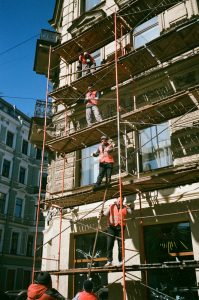 With the coronavirus pandemic still spreading across the globe, a lot of industries have been affected. Well, there is a huge worry on the impact of the outbreak on the scaffolding industry. As of 7th August, 2020, there are 308,134 infections of coronavirus in the UK and 46,413 reported deaths. The government is anxious to slow down the spread of the pandemic.
With the coronavirus pandemic still spreading across the globe, a lot of industries have been affected. Well, there is a huge worry on the impact of the outbreak on the scaffolding industry. As of 7th August, 2020, there are 308,134 infections of coronavirus in the UK and 46,413 reported deaths. The government is anxious to slow down the spread of the pandemic.
With the growing number of infections, the government has continuously laid down some drastic measures if the situation gets worse. Some of the measures include closing down schools, banning large public gatherings, cancelling events and working from home. However, for the latter, it’s tough to do it in the scaffolding industry or the construction industry, including companies like Waco Kwikform.
Reports indicate that at least 80% of people might be unable to work in the next few months because of the outbreak. The coronavirus outbreak has already penetrated the scaffolding industry and is recording high number with each passing day. However, there are measures in place to keep everything moving forward, even with more than half of the workforce being unable to do their job.
What’s the Effect of Coronavirus on the Scaffolding Industry?
1. Supply of Materials
Supply chains have been affected because of the virus. Note that, most of the scaffolding materials such as tubes and fittings are sourced from China, which is the epicentre of the coronavirus pandemic. Industry leaders in the scaffolding industry reported that they used their full production capacity during the winter season until February then they continued to expand their stocks in various factories.
Most of these companies do this to be prepared for the busy spring/summer season. They had increased their stock because of the past uncertainties – especially Brexit – to cushion for the tough months ahead. They are happy to report that they have large stocks of raw materials and are not dependent on products from their suppliers such as China. As such, they are prepared for whatever the outbreak brings in these uncertain times.
2. Scaffolding Training
When the lockdown was announced, various training courses for scaffolding were put to a stop in the UK. As such, many scaffolders were unable to participate in the necessary training courses required to upgrade safety when working. Nobody has been able to attain the Scaffolder CPD courses. As a result, many scaffolders are in a holding pattern as they wait for newer opportunities to upgrade their CISRS cards.
Training is done for both established professionals and newcomers in the scaffolding industry. That’s because there is always new legislation and best practice methods that should be updated. With there being no training because of the coronavirus pandemic, experts have come up with various ways to make sure that industry professionals are still learning.
3. Procedures at Construction Sites
With the onset of the outbreak, the government is keen on the construction industry progression. Of course, there are some restrictions in place. The industry now has a challenge to keep the workers safe from the usual risks at a construction site and ensure safe distance to avoid spreading the virus.
The guidance on how to progress in the industry with the looming pandemic is quite generic. As such, some industry leaders have come up with a way to interpret it in the scaffolding industry. These include the site operating procedures and many more guidelines to keep everyone safe as the work continues.
Some of the ways people are adhering to social distancing include:
- Consistency of work gangs
- Lone traveling
- Staggered shift and break times
- One-way systems
- Hand sanitisers available on site
- More space available in break rooms and washrooms
- Reducing the number of people working on lifts and hoists
- Cleaning equipment regularly including buttons and handles as well as other common touch points.
With these measures in place, there is a lot of hope that everything will continue with fewer coronavirus incidences in the scaffolding industry.
